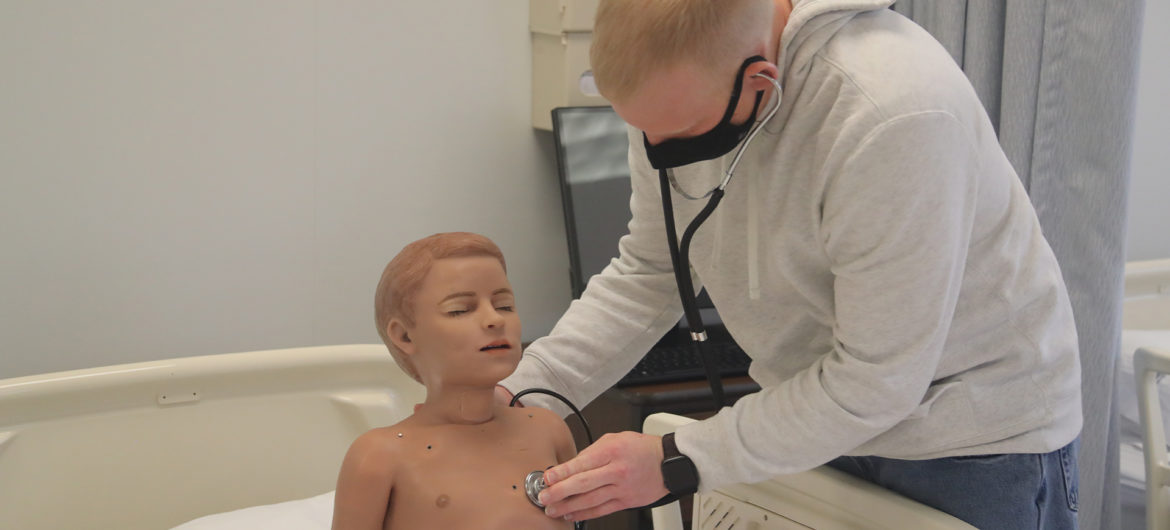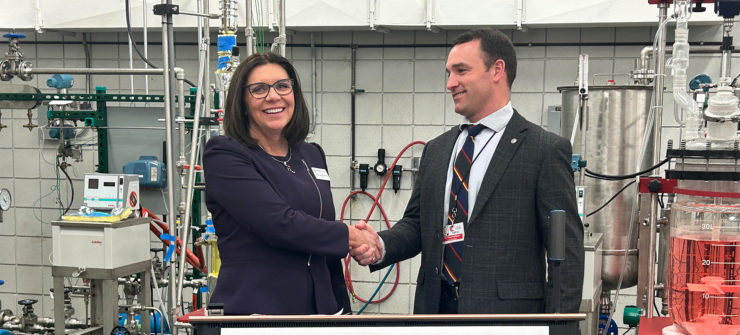MARIETTA, OHIO—Washington State College of Ohio (WSCO) has augmented its nursing lab with two additional human patient simulators. These robot-like mannequins allow for scenario-based training by replicating the clinical experience. They will also serve to supplement some of the hands-on hospital training.
Simulation learning is the process where students practice a procedure in a controlled learning environment. Students practice both clinical skills and critical thinking skills on realistic, interactive training mannequins that simulate a wide range of symptoms allowing students to experience medical emergencies and learn lifesaving skills in a managed setting. This teaching method allows students to gain valuable experience and learn techniques before they advance to a true clinical situation where they are working directly with patients.
WSCO Dean of Health and Science Dr. Heather Kincaid explained that the use of patient simulators has been a practice in nursing education for many years. In fact, prior to this purchase, Washington State already had one high-fidelity, iStan, one medium-fidelity, Juno, and 12 low-fidelity simulators. The difference between the high, medium, and low is the level of realism, with high fidelity providing the most advanced technology available. The two new simulators are both high-fidelity.
Pediatric Hal is a patient simulator designed to meet the needs of pediatric care training. Students can practice and develop airway management, auscultation, ventilation, CPR, and IV placement skills. Previously, Kincaid explained, the college was able to utilize the pediatric simulator housed at Marietta College, however, the growth of WSCO’s nursing program made the purchase imperative. Victoria is a lifelike childbirth simulator that replicates a full range of obstetrical events from early pregnancy complications, high-risk deliveries, and postpartum emergencies to non-gravid scenarios for general nursing care.
“These are the most advanced simulators on the market,” described Kincaid. “The procurement of this type of advanced technology will allow us to provide our students with the best obstetric and pediatric lab training possible.” She also pointed out that these simulators will be especially valuable if hospitals halt clinical training should there be a resurgence of COVID-19.
Earlier this year, healthcare facilities were forced to temporarily discontinue clinical training as they braced for the onslaught of COVID-19 patients. The change in procedure was to protect both students and patients from getting sick and to reserve personal protective equipment, including masks, that may be in short supply. For students, specifically, those who needed to complete training in obstetrics and pediatrics, this impacted their hospital clinical rotation. Fortunately, the Ohio Board of Nursing permits programs to offset clinical experience in this particular area with simulation. As a result, WSCO nursing students were able to effectively finish their required training in the nursing lab.
Kincaid said the pandemic provided the evidence that it was necessary for the college to reinforce its nursing lab with additional simulators. “Our nursing programs are among the best in the state and these simulators will help us maintain the integrity of our training and position us against future pandemic-like situations.” Because the purchase of the new simulators was a necessity directly related to the pandemic, the college was able to offset the $150,000 expense with Cares Act funds.
Washington State offers four enrollment options for students interested in a nursing career: the Practical Nursing program, the Associate Degree Nursing (ADN) program, the Advanced Placement ADN program, and the Education Advancement to Registered Nurse (EARN) Pathway. The Practical Nursing program prepares students to take the National Council Licensure Examination for Practical Nurses (NCLEX-PN) to become a Licensed Practical Nurse (LPN). The ADN program at WSCO follows a traditional model for students to take the National Council Licensure Examination for Registered Nurses (NCLEX-RN) while the Advanced Placement ADN program is designed for applicants who are already an LPN. The EARN Pathway is designed to provide a guided pathway to an ADN. This unique option gives accepted students one-on-one support with a dedicated faculty success coach as they complete general education requirements. It stands apart from other ADN programs by allowing pathway participants to complete general education and placement testing requirements while currently accepted as an ADN student. Once all prerequisites are successfully completed, pathway students seamlessly transition into Practical Nursing (PN) courses, and upon successful completion of the NCLEX-PN exam, transition into the ADN program.
For more information on any of WSCO’s nursing programs, contact Amanda Stilgenbauer at 740.885.5718 or at astilgenbauer@wscc.edu or visit wscc.edu/nursing. Applications are currently being accepted for ADN, Practical Nursing, and EARN.
Photo ID: Associate Degree Nursing student Billy Propes working with WSCO’s new patient simulator Pediatric Hal.





